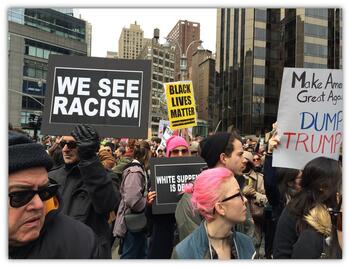
After Trump made a recent speech in Milwaukee in which he directly asked for black votes, I was asked to write a about it. My piece is now online in City Journal and is called “Trump’s Pitch to Blacks.”
I personally doubt whether he’s really going after black votes (though of course he wouldn’t mind getting some). Rather, this is designed to polish his image as more inclusive. What’s more, his language of “law and order” seems more designed to appeal to whites, and he mentions nothing about black grievances with the police (in contrast to his previous rhetoric in which he labeled the shootings of Alton Sterling and Philandro Castile “terrible” and “disgusting”).
He also talked about his economic policies, etc. But the focus of my piece was on his immigration pitch. Large scale immigration seems likely to downgrade black aspirations and social justice claims in the American political sphere over the long term:
As ethnic groups multiply and grow in America, often borrowing the template of the civil rights movement for their own goals, they dilute the claims of black Americans. A study by sociologists Mary C. Waters, Philip Kasinitz, and Asad L. Asad argued that “the increasing racial diversity of the population owing to immigration means policies that aim to promote racial equality but that are framed in terms of diversity often do not address the needs of native African Americans who, arguably, need such policies the most.” Diversity used to mean “black.” Now it can mean anything from a Mexican small-business owner to a Chinese software developer to a Pakistani doctor. Major Silicon Valley firms actually employ a lower share of whites than the population as a whole—and virtually no blacks.
Click through to read the whole thing.
I have generally been a proponent of immigration (or outsiders generally), arguing that a critical mass of outsiders is necessary to civic dynamism, and that we have actually sucked out many of the risk takers and entrepreneurs from Mexico.
But we can have too much of a good thing. Clearly, we’ve reached the point where the level of immigration is having socially destablizing consequences. Brexit is a perfect example. You can say that’s just racism or whatever. But even if it is, it doesn’t excuse Remainers who refused to make any changes from their share of the blame. Politics exists in the realm of human reality, not utopian ideals.
One likely consequence of U.S. diversification resulting from the current immigration trend is that the claims of blacks will be downgraded in society. Black Americans are longstanding citizens who have suffered unique historic injustices and have yet to be integrated into the economic and cultural mainstream of the country. I believe that’s an urgent task. But it doesn’t seem likely that immigrants and their children will feel a special debt to black Americans in the way that whites – soon to be a minority themselves – do.
Indeed, immigration has already shifted demographics in some cities to make the prospect of future black mayors very unlikely. I highlight this in the piece with regards to Chicago:
Immigration has also badly diluted black voting power and political influence in many cities. In 1980, Chicago was about 40 percent black and 14 percent Hispanic. Blacks and lakefront liberals formed an electoral alliance to elect Harold Washington as the city’s first black mayor in 1983. Today, after black population losses and a doubling of Latino population share, the city’s one-third white, one-third black, and one-third Latino population produces a divide-and-rule dynamic benefiting white mayors like Richard M. Daley and Rahm Emanuel.
Again, read the whole thing.
Aaron M. Renn is a senior fellow at the Manhattan Institute, a contributing editor of City Journal, and an economic development columnist for Governing magazine. He focuses on ways to help America’s cities thrive in an ever more complex, competitive, globalized, and diverse twenty-first century. During Renn’s 15-year career in management and technology consulting, he was a partner at Accenture and held several technology strategy roles and directed multimillion-dollar global technology implementations. He has contributed to The Guardian, Forbes.com, and numerous other publications. Renn holds a B.S. from Indiana University, where he coauthored an early social-networking platform in 1991.
Image at top my photo of an anti-Trump rally in New York. Cover photo by Gage Skidmore. CC BY-SA 3.0












